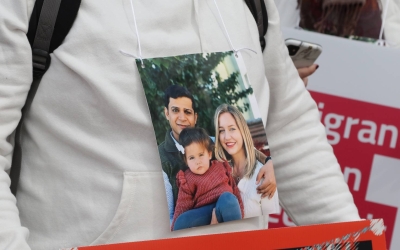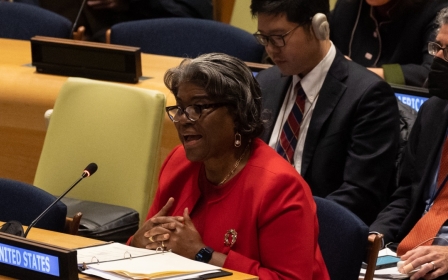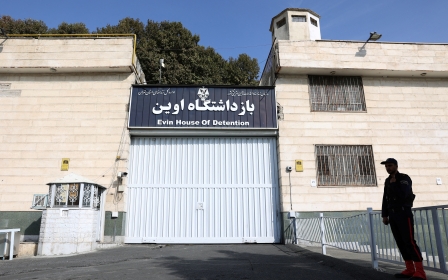US lawmakers propose bill to ban visas for families of Iranian officials

A small group of bipartisan members of US Congress has drafted new legislation to restrict the entry into the US of Iranian officials - and their families - responsible for the country's crackdown on protesters.
The bill, shared with Middle East Eye on Monday, was sponsored by Democrats Josh Gottheimer and Vicente Gonzalez and Republicans Claudia Tenney and Joe Wilson, a senior member of the House Foreign Affairs committee.
It would require US Secretary of State Antony Blinken to conduct a "review to determine whether any covered individual is ineligible for entry into the United States" based on a US law requiring the banning of foreign officials involved in "significant corruption" or human rights violations. Any person found ineligible and that has a US visa would have that visa revoked.
The range of individuals under the "covered" label includes: officers or employees in the Islamic Revolutionary Guards Corps; an officer in any other branch of Iran's armed forces; a member of Iran's law enforcement agencies; or any former or current member of Iran's executive, judicial and legislative branches of government.
The bill states this label includes “an immediate family member” of any of the described categories.
If passed, the legislation would effectively target any member of Iran's government to assess whether they or their family members should be banned from entering the US.
"Members of the Iranian regime cannot be trusted, nor should they be living the high life in the US while oppressing their own people in Iran," Gottheimer said in a statement.
The bill, however, offers a waiver for any Iranian officials entering the US for the purposes of coming to the United Nations headquarters in New York.
The Biden administration has previously restricted Iranian officials from obtaining visas to the US, including handing visa bans to two IRGC officials and their family members in March 2021.
The bill could further restrict the families of current or former members of Iran's military who were forced to serve due to the country's mandatory military service requirement.
Several family members of former IRGC members told MEE earlier this year that their family members are stuck in Iran and barred from entering the US even though their service did not involve military duties.
US sanctions
The proposed measure comes as protests have raged across Iran since 16 September, when Amini, a 22-year-old Kurdish woman, died after she sustained severe injuries while in police custody.
Iran has responded to the protests with a crackdown that has left hundreds dead, according to rights groups. In a report by CNN, covert testimonies describe the rape of men and women by security forces.
Tehran has given no death toll for protesters killed in the crackdown, but a deputy foreign minister, Ali Bagheri Kani, said last month that around 50 police had died and hundreds had been injured in the unrest - the first official figure for deaths among security forces.
Human rights groups say more than 200 people have been killed nationwide, including teenaged girls whose deaths have become a rallying cry for more demonstrations demanding the downfall of the Islamic Republic.
"The Iranian regime steals from and commits brutal atrocities against its citizens. Heroically, however, the Iranian people are standing up in the face of unthinkable dangers to advocate for basic human rights and dignity," Wilson said in a statement.
"It is wrong that corrupt regime officials and their family members would be awarded US visas to enjoy the very freedoms they deny their citizens."
The US has responded to Iran's crackdown by issuing sanctions against a number of officials, including Interior Minister Ahmad Vahidi, Communications Minister Eisa Zarepour, and five senior security officials for the shutdown of Iran's internet access in October.
Last week, the Islamic Republic was also removed from the UN's Commission on the Status of Women.
Middle East Eye propose une couverture et une analyse indépendantes et incomparables du Moyen-Orient, de l’Afrique du Nord et d’autres régions du monde. Pour en savoir plus sur la reprise de ce contenu et les frais qui s’appliquent, veuillez remplir ce formulaire [en anglais]. Pour en savoir plus sur MEE, cliquez ici [en anglais].





